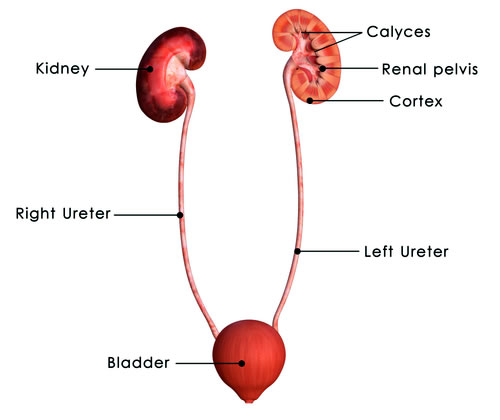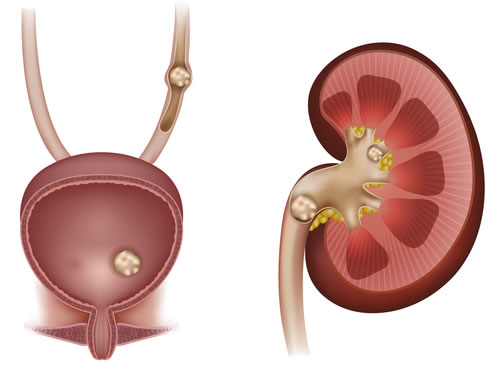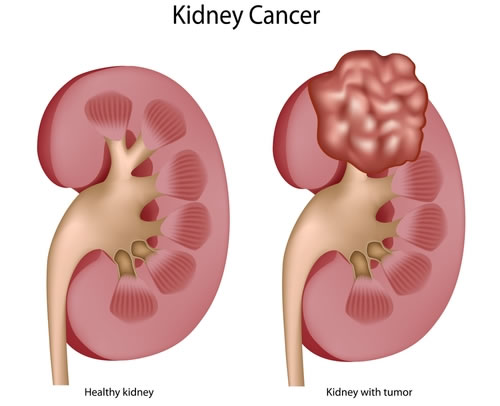Most people have two kidneys, which are organs shaped like kidney beans, each one about 10-15cms long, located either side of the spine, deep in the abdomen. However, it is possible to live a healthy and active life with only one functioning kidney. In rare instances people can be born with three kidneys, and likewise remain healthy. The ureters connect the kidneys to the bladder.
The main function of the kidney is to filter the blood of toxins and transform the waste into urine. The kidneys also produce hormones that help to control blood pressure, boost the production of red blood cells and help keep bones healthy.
Each kidney weighs about 160 grams and gets rid of between one and one-and-a-half litres of urine per day. The two kidneys together filter 200 litres of fluid every 24 hours.

Kidney problems are common. When the kidneys fail, waste products and fluid build-up in the body, making you feel unwell, gain weight, become breathless, and get swollen hands and feet. Occasionally, if kidney damage is severe it can lead to high blood pressure, anaemia and bone disease.
Renal Stones
Kidney stones are a collection of crystals that can develop in one or both kidneys. They vary from the size of a grain of sand to a golf ball. Small ones generally pass out with the urine. Although they don’t cause any serious problems, this can be very painful. Bigger stones can get stuck in the kidney or block the ureter (the tube from the kidneys to the bladder). This causes intense pain in the back or side of your abdomen, which may spread into the groin.

Kidney stones are quite common and usually affect people aged 30 to 60 years. They affect men more than women. It is estimated that renal colic affects about 10-20% of men and 3-5% of women. If you pass a renal stone, your lifetime risk of producing another stone is approximately 50%. Risk factors include: diet, obesity, hydration status and genetic factors.
LEEDS UROLOGY PARTNERSHIP can help:
- Fast track renal colic assessment – CT KUB and follow up within 24 hours
- Metabolic and gene testing for: Cysteinuria, Fanconi anemia, Hereditary distal renal tubular acidosis, Dent disease, Bartter syndrome types III and IV, Autosomal dominant hypocalcemic hypercalciuria, Familial hypomagnesemia, MEN-cancer related genes, hyperparathyroidism
- Dietary advice
- External Shockwave Lithotripsy (ESWL): non-invasive, outpatient treament
- Surgical stone removal using telescopic techniques (no cuts) & laser lithotripsy
On average, we can treat any acute kidney stone within 24 hours from diagnosis. If a stent is placed in the ureter/kidney; we ensure that it is in place for the shortest time possible before safely removing it under local anaesthesia. Full metabolic screening and nutritional support are established services offered to all our stone patients. Patients with recurrent stones will be given a treatment passport to allow the fastest possible access to our services in urgent or emergency situations.
Kidney Cancer
Kidney cancer accounts for 4% of all new cases of cancer diagnosed in men, and just over 2% of all cancers in women in the UK (excluding non-melanoma skin cancer). Increasingly, incidental asymptomatic kidney tumours are being detected by doctors investigating patients for non-related illnesses. These are usually picked up on ultrasound or CT scanning. It has been estimated that the lifetime risk of developing kidney cancer is 1 in 56 for men and 1 in 90 for women. It most commonly occurs in people aged 45-75 but can affect children too.

Symptoms that can occur include haematuria (blood in the urine), pain in the back, abdomen or flank. Rarely, we may observe alterations in either liver or kidney function on blood tests.
Risk factors & At risk groups include:
- An unhealthy diet and being overweight (obesity)
- Smoking may double the risk of developing kidney cancer for some people
- Genetic factors, such as a mutation in the von Hippel-Lindau gene, Birt-Hogg-Dubé syndrome, tuberous sclerosis and hereditary clear cell and papillary renal cell cancer
- Gender; men are twice as likely to suffer from kidney cancer than women
- Family history; people with a first degree relative (parent, sibling or child) with kidney cancer have about double the risk of developing kidney cancer themselves
- Certain medical conditions, such as high blood pressure (hypertension) and chronic kidney disease, especially people on long-term kidney dialysis, have a link to kidney cancer
- Previous thyroid cancer increases the risk of kidney cancer, possibly due to genetic changes that are common to both types of cancer (MEN Syndromes)
- Previous radiotherapy for testicular or cervical cancer (cancer of the neck of the womb) may slightly increase the risk of developing kidney cancer.
- Long-term regular use of painkillers, such as ibuprofen, naproxen, phenacetin and celebrex is linked to kidney cancer
LEEDS UROLOGY PARTNERSHIP can offer:
- Fast track haematuria (blood in pee) service – one stop assessment in less than 7 days
- Accurate diagnosis, staging and treatment planning
- Dedicated psychological & emotional support
- Expert counselling
- Referral for radical treatment – Robotic or laparoscopic nephrectomy (partial/total), cryoablation, radiofrequency ablation (RFA)
- Optimisation of medical therapy: targeted therapy and oncology support
- Access to international clinical trials
- Precision cancer testing – OncofocusTM
The world’s most comprehensive precision oncology test using novel gene sequencing techniques to identify the specific genetic mutations responsible for your cancer development and growth. These results are then matched to personalised, next generation cancer drugs to target your cancer.
Download a brochure
Obstructed Kidney
An obstructed kidney is also termed hydronephrosis. An obstructed kidney continues to produce urine and the build-up of urine within the kidney increases pressure within the kidney. The blockage can be due to an extrinsic (outside the urinary system) or intrinsic (inside the urinary system) cause, affecting one or both ureters at any level between the kidney and the end of the urethra (water-pipe). Occasionally, if both kidneys are obstructed then patients can suffer an acute kidney injury and possible renal failure. If the blockage is undiagnosed and associated infection occurs the pus can form quickly causing patients to become very ill.
Common causes include:
- Congenital (e.g. pelviureteric junction obstruction – PUJO)
- Kidney stones
- Cancer
- Fibrosis or scarring (e.g. post-surgery or retroperitoneal fibrosis – RPF)
- Blood clot
- Urethral or ureteric stricture or foreign body
- Prostate problems
LEEDS UROLOGY PARTNERSHIP can offer:
- Rapid assessment & diagnosis
- Renogram (DMSA, MAG-3) and CT urogram investigations
- Emergency placement of a ureteric stent (soft internal drainage tube) or nephrostomy (drainage tube directly into the kidney)
- Telescopic removal or destruction of stones or ureteric tumours
- Ureteric stent insertion (pigtail, Memokath)
- Balloon dilatation of ureteric strictures
- Referral for key-hole reimplantation or reconstructive surgery
- Medical or surgical management of obstructions secondary to: bladder, prostate or urethral problems
